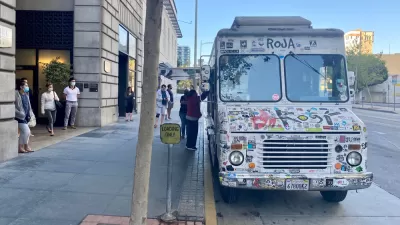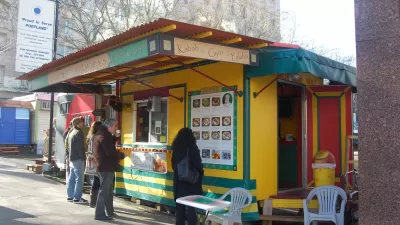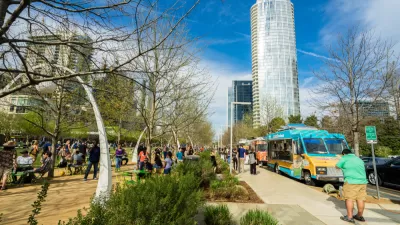Move over, ride-hailing companies. Food trucks have been responding to demand in neighborhoods.

Neighborhood visits are offering food trucks in the D.C. region a "rare bright spot during a financially difficult time," according to an article by Nevin Martell.
The example of Kim Gandy, a resident of Silver Spring, Maryland illustrates the concept. Gandy, with the help of some collaborators, sent a survey to a neighborhood listserv to gauge interest in a regular appointment with a D.C. food truck. The interest has been profound on both sides of the equation—residents and food truck operators.
"Between last September and January, Money Muscle BBQ earned almost equal revenue from doing neighborhood visits with their food truck as they did from selling on Uber Eats," reports Martell. "They sell food on the delivery app five days a week, while only booking one or two food truck outings per week."
Arranging regular neighborhood visits by food trucks can be time consuming, however, so another local resident of Silver Spring, Kyley McGeeney, is coaching people who want to bring food trucks to their neighborhoods "by sharing a master vendor list and walking them through every step of the process," according to Martell. The article includes more advice on how to set up food truck events complaint with local regulations.
FULL STORY: Did You Know You Can Hail a D.C. Food Truck To Your Neighborhood?

Planetizen Federal Action Tracker
A weekly monitor of how Trump’s orders and actions are impacting planners and planning in America.

Maui's Vacation Rental Debate Turns Ugly
Verbal attacks, misinformation campaigns and fistfights plague a high-stakes debate to convert thousands of vacation rentals into long-term housing.

San Francisco Suspends Traffic Calming Amidst Record Deaths
Citing “a challenging fiscal landscape,” the city will cease the program on the heels of 42 traffic deaths, including 24 pedestrians.

Amtrak Rolls Out New Orleans to Alabama “Mardi Gras” Train
The new service will operate morning and evening departures between Mobile and New Orleans.

The Subversive Car-Free Guide to Trump's Great American Road Trip
Car-free ways to access Chicagoland’s best tourist attractions.

San Antonio and Austin are Fusing Into one Massive Megaregion
The region spanning the two central Texas cities is growing fast, posing challenges for local infrastructure and water supplies.
Urban Design for Planners 1: Software Tools
This six-course series explores essential urban design concepts using open source software and equips planners with the tools they need to participate fully in the urban design process.
Planning for Universal Design
Learn the tools for implementing Universal Design in planning regulations.
Heyer Gruel & Associates PA
JM Goldson LLC
Custer County Colorado
City of Camden Redevelopment Agency
City of Astoria
Transportation Research & Education Center (TREC) at Portland State University
Jefferson Parish Government
Camden Redevelopment Agency
City of Claremont





























